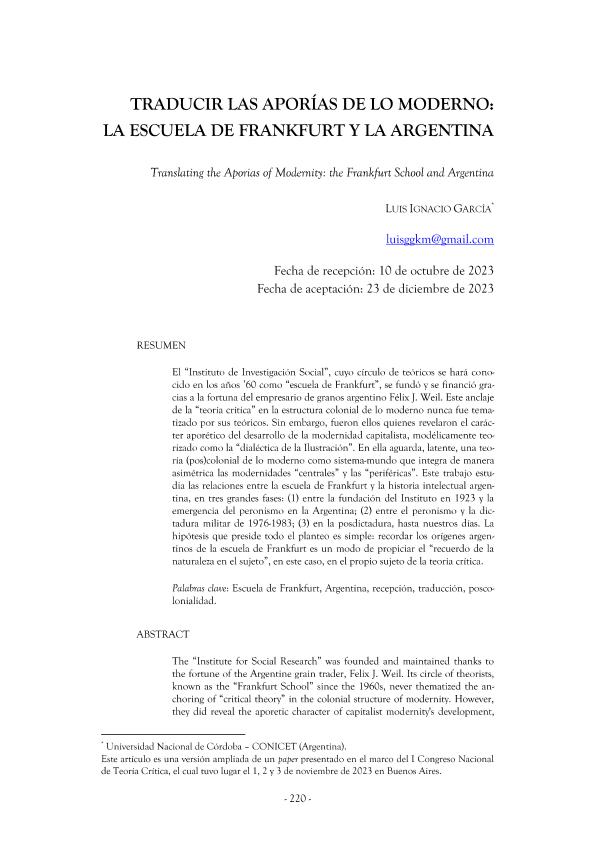Mostrar el registro sencillo del ítem
dc.contributor.author
Garcia Garcia, Luis Ignacio

dc.date.available
2024-03-08T18:23:10Z
dc.date.issued
2023-12
dc.identifier.citation
Garcia Garcia, Luis Ignacio; Traducir las aporías de lo moderno: La escuela de Frankfurt y la Argentina; Sociedad de Estudios de Teoría Crítica; Constelaciones; 15; 12-2023; 220-250
dc.identifier.uri
http://hdl.handle.net/11336/229892
dc.description.abstract
El “Instituto de Investigación Social”, cuyo círculo de teóricos se hará conocido en los años ’60 como “escuela de Frankfurt”, se fundó y se financió gracias a la fortuna del empresario de granos argentino Félix J. Weil. Este anclaje de la “teoría crítica” en la estructura colonial de lo moderno nunca fue tematizado por sus teóricos. Sin embargo, fueron ellos quienes revelaron el carácter aporético del desarrollo de la modernidad capitalista, modélicamente teorizado como la “dialéctica de la Ilustración”. En ella aguarda, latente, una teoría (pos)colonial de lo moderno como sistema-mundo que integra de manera asimétrica las modernidades “centrales” y las “periféricas”. Este trabajo estudia las relaciones entre la escuela de Frankfurt y la historia intelectual argentina, en tres grandes fases: (1) entre la fundación del Instituto en 1923 y la emergencia del peronismo en la Argentina; (2) entre el peronismo y la dictadura militar de 1976-1983; (3) en la posdictadura, hasta nuestros días. La hipótesis que preside todo el planteo es simple: recordar los orígenes argentinos de la escuela de Frankfurt es un modo de propiciar el “recuerdo de la naturaleza en el sujeto”, en este caso, en el propio sujeto de la teoría crítica.
dc.description.abstract
The “Institute for Social Research” was founded and maintained thanks to the fortune of the Argentine grain trader, Felix J. Weil. Its circle of theorists, known as the “Frankfurt School” since the 1960s, never thematized the anchoring of “critical theory” in the colonial structure of modernity. However, they did reveal the aporetic character of capitalist modernity's development, and exemplarily theorized it as the “dialectic of the Enlightenment”, where a (post)colonial theory of the modern as a world-system asymmetrically integrating “central” and “peripheral” modernities is latent. This paper studies the relationship between the Frankfurt School and Argentine intellectual history in three main phases: (1) between the founding of the Institute in 1923 and the emergence of Peronism in Argentina; (2) between Peronism and the military dictatorship of 1976-1983; (3) in the post-dictatorship years up to the present day. The hypothesis that guides this work is simple: remembering the Argentine origins of the Frankfurt School is a way of promoting the “remembrance of nature within the subject”, which in this case is the subject of critical theory itself.
dc.format
application/pdf
dc.language.iso
spa
dc.publisher
Sociedad de Estudios de Teoría Crítica
dc.rights
info:eu-repo/semantics/openAccess
dc.rights.uri
https://creativecommons.org/licenses/by-nc-sa/2.5/ar/
dc.subject
ESCUELA DE FRANKFURT
dc.subject
ARGENTINA
dc.subject
RECEPCIÓN
dc.subject
TRADUCCIÓN
dc.subject
POSCOLONIALIDAD
dc.subject.classification
Filosofía, Historia y Filosofía de la Ciencia y la Tecnología

dc.subject.classification
Filosofía, Ética y Religión

dc.subject.classification
HUMANIDADES

dc.subject.classification
Arte, Historia del Arte

dc.subject.classification
Arte

dc.subject.classification
HUMANIDADES

dc.subject.classification
Otras Humanidades

dc.subject.classification
Otras Humanidades

dc.subject.classification
HUMANIDADES

dc.title
Traducir las aporías de lo moderno: La escuela de Frankfurt y la Argentina
dc.title
Translating the Aporias of Modernity: The Frankfurt School and Argentina
dc.type
info:eu-repo/semantics/article
dc.type
info:ar-repo/semantics/artículo
dc.type
info:eu-repo/semantics/publishedVersion
dc.date.updated
2024-03-08T14:25:38Z
dc.identifier.eissn
2172-9506
dc.journal.number
15
dc.journal.pagination
220-250
dc.journal.pais
España

dc.journal.ciudad
Madrid
dc.description.fil
Fil: Garcia Garcia, Luis Ignacio. Consejo Nacional de Investigaciones Científicas y Técnicas. Centro Científico Tecnológico Conicet - Córdoba. Instituto de Humanidades. Universidad Nacional de Córdoba. Instituto de Humanidades; Argentina
dc.journal.title
Constelaciones
dc.relation.alternativeid
info:eu-repo/semantics/altIdentifier/url/https://constelaciones-rtc.net/article/view/5268
Archivos asociados
